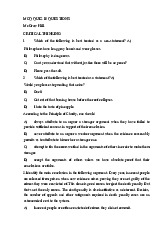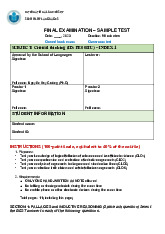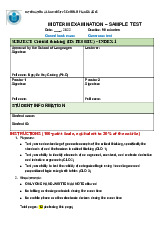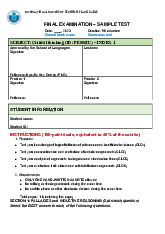



Preview text:
VIETNAM NATIONAL UNIVERSITY - HCMC INTERNATIONAL UNIVERSITY Department of English COURSE SYLLABUS
Course Name: Critical Thinking Course Code: PE008IU 1. General information Course description
This course provides the nature and techniques of thought as a basis for our
claims, beliefs, and attitudes about the world. The course also explores the
process in which people develop their claims and support their beliefs.
Specifically, the course includes the theory and practice of presenting arguments
in oral and written forms, making deductive and inductive arguments, evaluating
the validity or strength of arguments, detecting fallacies in arguments, and
refuting fallacious arguments.
Resources for the reasoning process include hypothetical and real-life situations
in various fields of natural sciences, social sciences, and humanities. Semester(s) in 1, 2, 3 which the course is taught Instructors Trầần Thanh Tú (Ph.D) Nguyễễn Thị Th y (Ph.D) ủ Ph m Ng ạ c (Ph.D) ọ
Nguyễễn Văn Tiễếp (Ph.D) Vũ Tiễến Th nh (MA) ị Đỗễ Th Di ị ệu Ngọc (MA) Language English Relation to Compulsory curriculum Teaching methods
Lectures, discussions, homework assignments, students’ presentations 1 Workload (incl.
(Estimated) total workload: 135 contact hours, self- Contact hours: 45 study hours) Self-study: 90 Credit points 3 Required and None recommended prerequisites for joining the course Course objectives
This course will enable students to
● develop the habits of assessing and defending the reasonableness of their
beliefs and values as well as those of others
● appreciate the importance of looking at an issue from a variety of perspectives
● apply critical thinking skills in both public and personal settings Course learning
Upon the successful completion of this course, students will be able to outcomes
● CLO1: apply the standards of and avoid barriers to critical thinking in various contexts
● CLO2: identify, construct, and evaluate deductive and inductive arguments in spoken and written forms
● CLO3: test the validity of deductive arguments using Venn diagram and truth tables
● CLO4: recognize common fallacies in everyday reasoning
● CLO5: standardize and refute arguments
● CLO6: develop good arguments to defend personal/group beliefs in
respectful manners (project presentations) Examination forms
40 multiple-choice questions for the midterm and final exams and group
presentations for the final project Study and
Attendance: A minimum attendance of 80 percent is compulsory for the class examination
sessions. Students will be assessed on the basis of their class participation. requirements
Questions and comments are strongly encouraged. Overall passing score: 50/100 Textbook
[1] Bassham, Irwin, Nardone, and Wallace, Critical Thinking: A Student's
Introduction, 6th edition, McGraw-Hill Education, 2020. 2 References
[2] Moore, B.N. et al. (2009). Critical Thinking, 9th ed. McGraw-Hill
[3] Patrick J. Hurley (2012). A Concise Introduction to Logic (11th ed.), Wadsworth, Cengage Learning + Relevant web resources
2. Planned learning activities and teaching methods Learning Week Topic CLO Assessments activities Resources
Introduction to Critical thinking HW 1/Quiz 1 Lecture, Discussion, Homework, [1] Chapter 1 1 1 Quiz Recognizing arguments HW 2/Quiz 2 Lecture, [1] Chapter 2 Discussion, Homework, 2 2 Quiz Basic logical concepts HW 3/Quiz 3 Lecture, [1] Chapter 3 Discussion, Homework, 3 2 Quiz A little categorical logic HW 4/Quiz 4 Lecture, [1] Chapter 9 Discussion, Homework, 4 3 Quiz A little propositional logic HW 5/Quiz 5 Lecture, [1] Chapter 10 Discussion, Homework, 5 3 Quiz Logical fallacies I HW 6/Quiz 6 Lecture, [1] Chapter 5 Discussion, Homework, 6 4 Quiz HW 7/Quiz 7 Lecture, [1] Chapter 6 Logical fallacies II Discussion, Homework, 7 4 Quiz 8
Review for midterm exam + sample test 9 + 10
Midterm exam: Chapters 1, 2, 3, 9, 10 11 Analyzing arguments 5 HW 8/Quiz 8 Lecture, [1] Chapter 7 Discussion, 3 Homework HW 9/Quiz 9 Lecture, [1] Chapter 8
Evaluating arguments and truth Discussion, claims 12 5 Homework HW 10/Quiz 10 Lecture, [1] Chapter 11 Inductive reasoning Discussion, 13 2 Homework Group work Presentation, Project: Group presentation 14 6 Discussion Group work Presentation, Project: Group presentation 15 6 Discussion Group work Presentation, Project: Group presentation 16 6 Discussion 17
Review for final exam + sample test 18 Reserved week 19+20
Final exam: Chapters 5, 6, 7, 8, 11 Coordinator: Đỗễ Th Di ị ệu Ng c ọ
Ho Chi Minh City, July 20, 2022 Contact details:
Approved by Head of Department of English Email: dtdngoc@hcmiu.edu.vn (Signature) Mobile: 0904361717
Dr. Nguyễễn Huy Cường 4




